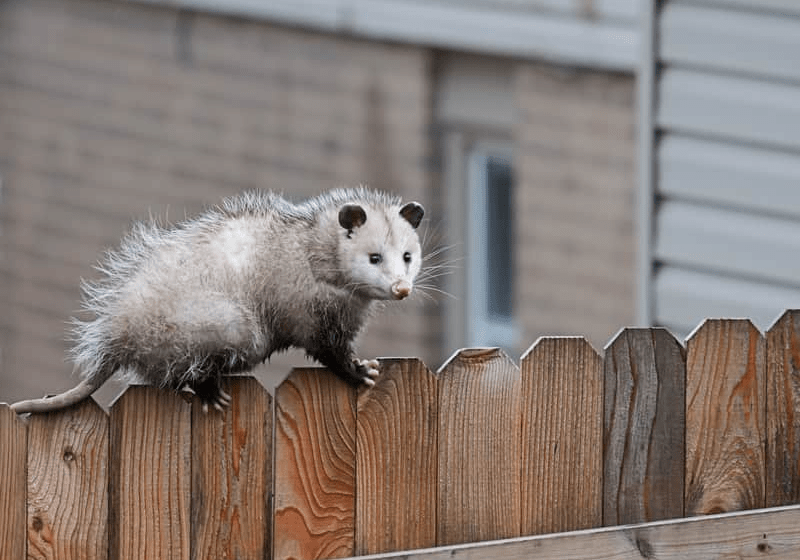Opossums, Unwanted Guests At Home

Maybe you found one in your backyard and didn’t know what to do about it; in fact, it frightened you. To many, opossums are giant rats, but they are marsupials, unique to the Americas.
While opossums were once a species native to South America, they have now spread across the continent and are commonly found in the eastern and southern states of the United States. Opossums are easily recognizable by their snow-white faces, brown/black body, and long pink hairless tail. This tail is prehensile, and the opossum can often be seen carrying food on its tail or hanging from a tree by its tail. Opossums are considered an invasive species because they are not native to this land; however, they are already accepted as a common nuisance by those who suffer from opossums in their area. Opossums are generally not aggressive but can create unsanitary conditions and become hostile if they become sick.
Their diet is based on rodents, insects (ticks, fleas, bedbugs, cockroaches, and others), small reptiles, arachnids, fruits, and carrion (dead animals). Urbanization has spread to the forests where they live, so they tend to enter residences searching for food; their habitat is being lost at an accelerated rate.
Opossums become pests because they tend to sneak into any place to find food. Once they become aware of the presence of food in your home, you can be sure they will re-enter daily, wreaking havoc in your yard or home.
Opossums are capable of transmitting diseases to humans but also our pets. They can carry ticks, lice, mites, and fleas. In turn, these parasites can be carriers of other pathologies.
These animals cause terrible messes with garbage cans if they are not adequately secured. They will also take any vegetables or fruit you grow in your garden, as well as devour your pets’ food if you leave them outside. Possum droppings may contain parasites that affect your pets. These marsupials will take up residence on your property, eventually gnawing through the outside of the walls to enter the house, either through the garage, shed, attic, etc. In the process, they will damage drywall, gnaw through electrical wiring, and may cause damage to all insulation in your home. Opossums will often die inside the house, in their hiding place, creating a biohazard for both your family and pets. That’s why you want to hire a possum removal professional; they know how to make them safe to a much appropriate environment and cleaning the mess they left behind.
They are resistant to diseases that can harm humans, such as rabies and other viruses, so generally speaking, you are not in danger if one approaches you or your pets, although it will want to defend itself out of fear, and its bite is strong. When it feels attacked, it also goes into a coma that can last up to 40 minutes.
If you are looking to keep opossums away from your property, try these tips.
Simple tactics to scare away opossums by installing motion-activated sprinklers or lights.
Place these devices near the perimeter of your home, out front, around fruit trees, or anywhere else you have observed opossums. Motion-activated devices are triggered once an opossum crosses the sensor, and once they are turned on, they can scare off many opossums. Motion-activated sprinklers tend to be slightly more effective than lights. Lights work on skittish opossums that are afraid of humans, but those that are already accustomed to your presence will be unaffected; water sprinklers, on the other hand, work better on those that are a bit bolder and harder to scare away.
Presence of dog or cat
The scent of a potential predator may be enough to deter many opossums from settling or loitering on your property. Walk and let your dog or cat play, under your supervision, in the garden and places where you have seen opossums. However, do not allow your dog or cat to roam freely in the yard to scare off opossums. They could get into a fight with aggressive opossums or other dangerous animals. Instead, collect pet hair after brushing your dog or cat. Please place it in small mesh bags and hang or spread it around areas where opossums accumulate.
The opossum cannot be domesticated; its habits are not related to humans, so it cannot adapt; A professional possum removal service will take this animal out of your house and get him live in its natural habitat.